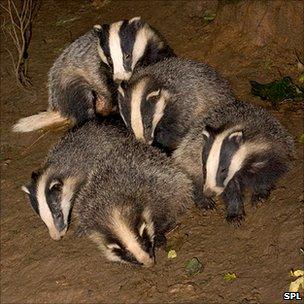Government 'to back badger cull for South West'
- Published
- comments

The badger (Meles meles) is a protected species under UK and European laws
The government is expected to announce it will back a cull of badgers in south-west England.
The coalition has always said it was "minded" to introduce culling to help fight bovine TB.
A similar badger cull was approved in Wales but the decision was overturned in the High Court.
Sources have told ǵüµÇ¨û§ West political correspondent Paul Barltrop the two areas where the cull will operate will be in Gloucestershire and Devon.
Campaign organisations remain opposed to the cull and are likely to challenge it in court.
Bovine TB costs the UK economy about ôÈ100m per year, blighting farmers in areas such as south-west England, with tens of thousands of cattle killed.
It is likely plans for a cull will move a step forward, with the government indicating that nothing in its lengthy public consultation has changed its mind.
The Environment Secretary, Caroline Spelman, will address MPs in the Commons later in response to a consultation on badger control.
But ǵüµÇ¨û§ environment correspondent Jeremy Cooke said it still seemed unlikely that any cull of badgers would happen in the immediate future.
There could be further consultation on the method which would be used to kill badgers and how the cull would be organised.
The government also knows that it is certain to face legal challenges by campaigners who insist that the scientific evidence suggests that culling badgers would not reduce levels of bovine TB, but may actually make it worse, our correspondent says.
'Something must be done'
Last month, a poll for the ǵüµÇ¨û§ suggested a majority of Britons in both town and country opposed killing badgers to curb cattle tuberculosis.
Peter Kendall, president of the National Farmers Union, and Jack Reedy, from the Badger Trust, debate the controversial cull
Across the country, 63% said badgers should not be killed for cattle TB, with 31% in favour of culling and the remainder undecided.
But one cattle farmer, Aled Rees, said something had to be done.
He said: "I don't want to kill badgers unnecessarily, but we can't go on as we are. Something has to be done about it and let's get into a position, sometime in the future, where we can vaccinate the cattle and vaccinate the badgers and have an an end to all this."
However, Jack Reedy, from the Badger Trust, said the culling of badgers would make the spread of cattle TB worse.
"Lord Krebs last week and a group of other scientists put forward very cogent arguments again as to why there's a grave danger of spreading disease further if you disturb the badger population, he said.
"Naturally the badgers stay in one location, very tightly controlled territories. If you kill the badgers others move in from another territory."
Government statistics show that the incidence of cattle TB declined slightly between 2009 and 2010, probably due to the escalation of TB testing on farms and restrictions on herd movements.
However, provisional figures indicate that incidence was slightly higher in the first two months of this year than in the corresponding period for 2010.
The European badger (Meles meles) is a protected species under European and UK law but ministers can sanction killing in certain circumstances, including to tackle disease.
- Published19 July 2011
- Published8 June 2011
- Published19 November 2010
- Published24 May 2011
- Published8 June 2011
- Published20 April 2011
- Published1 December 2010
- Published15 September 2010